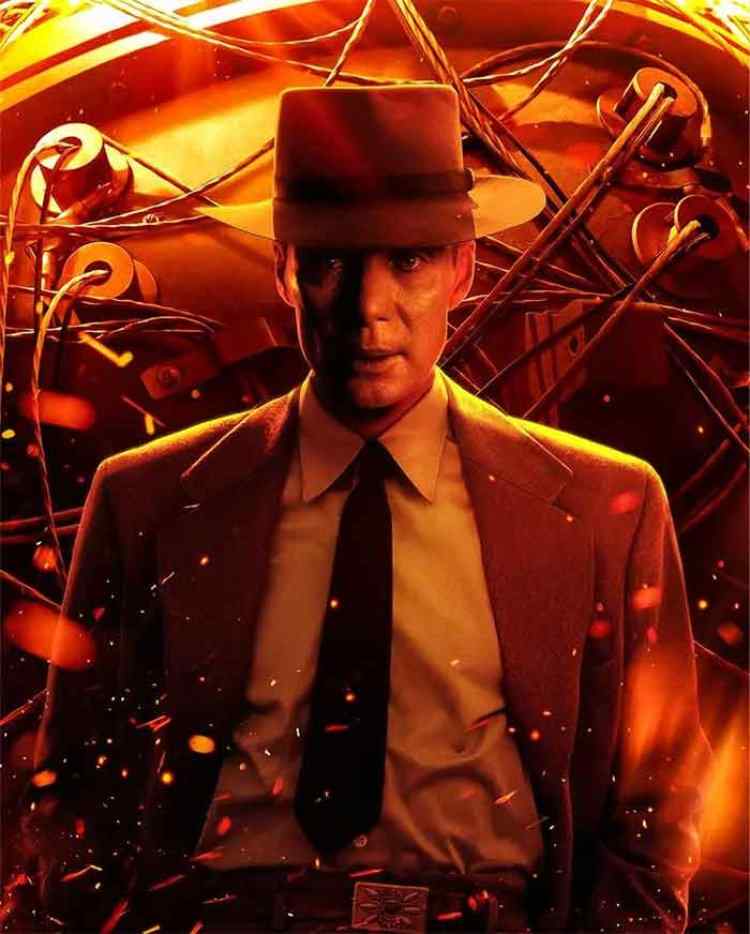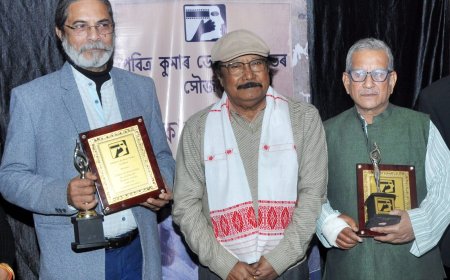WHY I DID NOT REVIEW OPPENHEIMER – THE FILM
Dr. Shoma A. Chatterji provides scholarly analysis on the film, "Oppenheimer."

Biographical films or bio-pics in common parlance has taken prime space in the realm of Bollywood and Hollywood cinema. They are rarely out-of-the-box as more often, they are designed to be mainstream with a generous sprinkling of ideology on the one hand and pedagogy on the other, In fact, biographical films today claim several genres of cinema.
As a critic, my viewings of English and American biographical films have been targeted mainly towards enhancing my own information and knowledge and not for any analytical critique. But every film I watched in the genre of biographical fiction has remained engraved on my mind forever. They were exploratory, sometimes investigative, often emotional and sometimes, brazenly promotional and romanticized. But the fact remains that they were good films as “cinema” and would offer excellent scope for students and scholars of film studies. Among them, the milestones I would like to ,mention are – The King’s Speech (2010), a British film directed by Tom Hooper, Schindler’s List (1993) directed by Steven Spielberg, The Theory of Everything (2014) directed by James Marsh, The Danish Girl (2015) directed by Tom Hooper, Lust for Life (1956) on the life of Van Gogh directed and enacted by Kirk Douglas, El Cid (1961) on the life and death of El Cid, Lawrence of Arabia (1962), Patton (1970), The Last Emperor (1987), Born on the Fourth of July (1988), Elizabeth (1997), Shakepeare in Love (1998), Boys Don’t Cry (1998), Erin Brockowich (1999), A Beautiful Mind (2000), Milk (2008), and so on.
If you put them together in one box, and watch them one after another, your window to the world will open up and you will be able to see the rainbow made up of radically different genres covering kings and queens, authors and artists, killers and politicians, radical leaders like Che Guevara to defense innovators like Patton. Historical figures like Napoleon and Che Guevara have been dealt with several times and the same goes for Van Gogh the painter who died as poor as a church mouse. Even Lissie Borden, the girl who took an axe and cut up her parents has had two or three versions of bio-fiction made on her life. Charlie Chaplin on the other hand, had only one. Elizabeth I and Henry VIII have had more than one version. However, in case of personalities like Lizzy Borden, the entertainment factor plays a bigger role since the facts of her case are too tough to verify and raise doubts about their authenticity. I have not had the opportunity of watching Hitchcock but have heard a lot of praise about the film.
In case of bio-fiction in cinema, the question of authenticity is a moot one because one does not know what the producer-directors are aiming at – (a) making a serious and honest feature film that more or less approximates the real life story as we know it; (b) whether the producer has the hidden agenda of promoting the subject of the film and/or whitewashing him/her by providing one or more back stories to justify any negative elements of the character creeping into the film; (c) to make an unabashed, commercial entertainer with the engine running on full-fledged song-dance numbers, fights, fisticuffs, villains and good men and women; (d) choosing the timing of the film to fit into the political ambience of the country before, during and after elections in a democracy like India; (e) choosing the subject/protagonist of the film based on how much drama, melodrama, conflict and topicality he/she may be expected to generate among the target audience; (f) targeting the subject and the time to fit into the film festival ambience where the box office does not quite matter.
Though I watched a ticketed show of Oppenheimer at a multiplex with excellent screening infra-structure, I liked the film as a film per se, I restrained my inclination to review it. Why? The first reason is that I felt a strong ideological obstacle in reviewing a film about the famous and infamous scientist who ought to be held entirely responsible for the needless deaths of an estimated 100,000 to 200,000 people in Hiroshima and Nagasaki in August 1945.
The explosion that is depicted in the film is that of “The Gadget,” the test bomb, and not the ones that were dropped in Hiroshima and Nagasaki. This choice is justifiable, because the film is not simply about the application of the atomic bomb, but about the larger consequences of its creation. Christopher Nolan had insisted that no CGI would be used in the film. How could I even submit myself to write about a film based on the life of J. Robert Oppenheimer, “famous” as the “father of the atom bomb” who created the world’s first nuclear weapon during World War II? As a film journalist, it was my responsibility to review the film. I admit that I have failed to fulfill this responsibility. But as a human being, with strong ethics planted in me, born during World War II, I simply could not.
According to Aditya Modak, film scholar based in Tripura, “the detonation is shown from Oppenheimer’s perspective. It is not presented as a typical countdown scene, and is not a strictly “realistic” depiction, but rather a psychological one. Specific scenes from films and TV shows gain some sort of autonomy in popular culture, and get regarded as iconic; the explosion scene in Oppenheimer definitely deserves to be ranked as such. Oppenheimer’s anxiety in this scene can be felt viscerally, as the creator looks at his creation and realises what he has unleashed into the world.”
The second reason I did not dare to do a review or an analysis of the film is because I am a woman and being one, I have always been subtly, or not so subtly, discouraged from stepping into any serious study or understanding of “science” subjects like Physics and Maths. Why? Just because I was born a girl! So, even while watching the film, most of the technological details such as the arguments, discussions, debates and round-tables about the experiments leading to the making of the nuclear weapon went clearly over my head.
But soon after, my judgment and knowledge were completely overturned. I read that, there were over 100 women involved in the Chandrayaan-3 mission, India’s third lunar exploration mission. Two of them were Vanitha Muthayya and Ritu Karidhal, who led the mission as project director and mission director respectively. So, why was I discouraged from pursuing Maths because the Maths teacher openly claimed that I “had no brain for Maths” and I took it as serious advice instead of taking it as an insult? I forgot I had scored 100/100 in Maths in a primary exam. I forgot I could duplicate excellent diagrams in Physics. I forgot even that I was reasonably intelligent and gave up touching these subjects with a ten-feet-long pole! The result is – I do not consider myself to be qualified enough to review a heavy film like Oppenheimer.
What touched me are the human and humane stories that came across through the film. I was deeply touched by the ethnical vacillations Oppenheimer himself was going through while he was actually working, through and over many obstructions and obstacles on his destructive project; or, the young, lady physics scholar included in the Manhattan Project touched upon but very briefly, or, the emotionally involved Communist girl crazily in love followed by Oppenheimer’s distancing from her followed by the tragic suicide, or, when his wife tells the guilt-ridden husband, “How can you expect that you will commit mistakes and everyone else will shower you with empathy?” The constant sounds of the crying baby, the ‘betrayal’ by the wife, the tremendous thrill Oppenheimer must have felt after inventing something that can shake the world completely are other emotional touches that impacted on this viewer.
Let me end with the last word on the film by Gautam Sunder in his review of the film in The Hindu. He writes: “Armed with a haunting Cillian Murphy as J. Robert Oppenheimer, Christopher Nolan gives us his most personal and political film yet, that is fascinating as it is flawed.”
***
What's Your Reaction?


































































